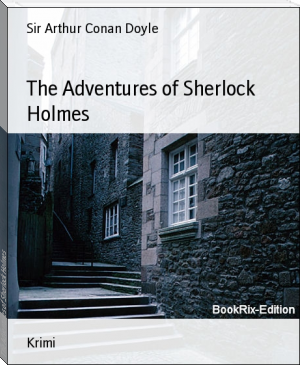The Adventures of Sherlock Holmes - Arthur Conan Doyle (ebook reader with highlight function TXT) 📗

- Author: Arthur Conan Doyle
- Performer: 0192835084
Book online «The Adventures of Sherlock Holmes - Arthur Conan Doyle (ebook reader with highlight function TXT) 📗». Author Arthur Conan Doyle
“You want to go home, no doubt, Doctor,” he remarked as we emerged.
“Yes, it would be as well.”
“And I have some business to do which will take some hours. This business at Coburg Square is serious.”
“Why serious?”
“A considerable crime is in contemplation. I have every reason to believe that we shall be in time to stop it. But to-day being Saturday rather complicates matters. I shall want your help to-night.”
“At what time?”
“Ten will be early enough.”
“I shall be at Baker Street at ten.”
“Very well. And, I say, Doctor, there may be some little danger, so kindly put your army revolver in your pocket.” He waved his hand, turned on his heel, and disappeared in an instant among the crowd.
I trust that I am not more dense than my neighbours, but I was always oppressed with a sense of my own stupidity in my dealings with Sherlock Holmes. Here I had heard what he had heard, I had seen what he had seen, and yet from his words it was evident that he saw clearly not only what had happened but what was about to happen, while to me the whole business was still confused and grotesque. As I drove home to my house in Kensington I thought over it all, from the extraordinary story of the red-headed copier of the Encyclopaedia down to the visit to Saxe-Coburg Square, and the ominous words with which he had parted from me. What was this nocturnal expedition, and why should I go armed? Where were we going, and what were we to do? I had the hint from Holmes that this smooth-faced pawnbroker’s assistant was a formidable man—a man who might play a deep game. I tried to puzzle it out, but gave it up in despair and set the matter aside until night should bring an explanation.
It was a quarter-past nine when I started from home and made my way across the Park, and so through Oxford Street to Baker Street. Two hansoms were standing at the door, and as I entered the passage I heard the sound of voices from above. On entering his room, I found Holmes in animated conversation with two men, one of whom I recognised as Peter Jones, the official police agent, while the other was a long, thin, sad-faced man, with a very shiny hat and oppressively respectable frock-coat.
“Ha! Our party is complete,” said Holmes, buttoning up his pea-jacket and taking his heavy hunting crop from the rack. “Watson, I think you know Mr. Jones, of Scotland Yard? Let me introduce you to Mr. Merryweather, who is to be our companion in to-night’s adventure.”
“We’re hunting in couples again, Doctor, you see,” said Jones in his consequential way. “Our friend here is a wonderful man for starting a chase. All he wants is an old dog to help him to do the running down.”
“I hope a wild goose may not prove to be the end of our chase,” observed Mr. Merryweather gloomily.
“You may place considerable confidence in Mr. Holmes, sir,” said the police agent loftily. “He has his own little methods, which are, if he won’t mind my saying so, just a little too theoretical and fantastic, but he has the makings of a detective in him. It is not too much to say that once or twice, as in that business of the Sholto murder and the Agra treasure, he has been more nearly correct than the official force.”
“Oh, if you say so, Mr. Jones, it is all right,” said the stranger with deference. “Still, I confess that I miss my rubber. It is the first Saturday night for seven-and-twenty years that I have not had my rubber.”
“I think you will find,” said Sherlock Holmes, “that you will play for a higher stake to-night than you have ever done yet, and that the play will be more exciting. For you, Mr. Merryweather, the stake will be some £30,000; and for you, Jones, it will be the man upon whom you wish to lay your hands.”
“John Clay, the murderer, thief, smasher, and forger. He’s a young man, Mr. Merryweather, but he is at the head of his profession, and I would rather have my bracelets on him than on any criminal in London. He’s a remarkable man, is young John Clay. His grandfather was a royal duke, and he himself has been to Eton and Oxford. His brain is as cunning as his fingers, and though we meet signs of him at every turn, we never know where to find the man himself. He’ll crack a crib in Scotland one week, and be raising money to build an orphanage in Cornwall the next. I’ve been on his track for years and have never set eyes on him yet.”
“I hope that I may have the pleasure of introducing you to-night. I’ve had one or two little turns also with Mr. John Clay, and I agree with you that he is at the head of his profession. It is past ten, however, and quite time that we started. If you two will take the first hansom, Watson and I will follow in the second.”
Sherlock Holmes was not very communicative during the long drive and lay back in the cab humming the tunes which he had heard in the afternoon. We rattled through an endless labyrinth of gas-lit streets until we emerged into Farrington Street.
“We are close there now,” my friend remarked. “This fellow Merryweather is a bank director, and personally interested in the matter. I thought it as well to have Jones with us also. He is not a bad fellow, though an absolute imbecile in his profession. He has one positive virtue. He is as brave as a bulldog and as tenacious as a lobster if he gets his claws upon anyone. Here we are, and they are waiting for us.”
We had reached the same crowded thoroughfare in which we had found ourselves in the morning. Our cabs were dismissed, and, following the guidance of Mr. Merryweather, we passed down a narrow passage and through a side door, which he opened for us. Within there was a small corridor, which ended in a very massive iron gate. This also was opened, and led down a flight of winding stone steps, which terminated at another formidable gate. Mr. Merryweather stopped to light a lantern, and then conducted us down a dark, earth-smelling passage, and so, after opening a third door, into a huge vault or cellar, which was piled all round with crates and massive boxes.
“You are not very vulnerable from above,” Holmes remarked as he held up the lantern and gazed about him.
“Nor from below,” said Mr. Merryweather, striking his stick upon the flags which lined the floor. “Why, dear me, it sounds quite hollow!” he remarked, looking up in surprise.
“I must really ask you to be a little more quiet!” said Holmes severely. “You have already imperilled the whole success of our expedition. Might I beg that you would have the goodness to sit down upon one of those boxes, and not to interfere?”
The solemn Mr. Merryweather perched himself upon a crate, with a very injured expression upon his face, while Holmes fell upon his knees upon the floor and, with the lantern and a magnifying lens, began to examine minutely the cracks between the stones. A few seconds sufficed to satisfy him, for he sprang to his feet again and put his glass in his pocket.
“We have at least an hour before us,” he remarked, “for they can hardly take any steps until the good pawnbroker is safely in bed. Then they will not lose a minute, for the sooner they do their work the longer time they will have for their escape. We are at present, Doctor—as no doubt you have divined—in the cellar of the City branch of one of the principal London banks. Mr. Merryweather is the chairman of directors, and he will explain to you that there are reasons why the more daring criminals of London should take a considerable interest in this cellar at present.”
“It is our French gold,” whispered the director. “We have had several warnings that an attempt might be made upon it.”
“Your French gold?”
“Yes. We had occasion some months ago to strengthen our resources and borrowed for that purpose 30,000 napoleons from the Bank of France. It has become known that we have never had occasion to unpack the money, and that it is still lying in our cellar. The crate upon which I sit contains 2,000 napoleons packed between layers of lead foil. Our reserve of bullion is much larger at present than is usually kept in a single branch office, and the directors have had misgivings upon the subject.”
“Which were very well justified,” observed Holmes. “And now it is time that we arranged our little plans. I expect that within an hour matters will come to a head. In the meantime Mr. Merryweather, we must put the screen over that dark lantern.”
“And sit in the dark?”
“I am afraid so. I had brought a pack of cards in my pocket, and I thought that, as we were a partie carrée, you might have your rubber after all. But I see that the enemy’s preparations have gone so far that we cannot risk the presence of a light. And, first of all, we must choose our positions. These are daring men, and though we shall take them at a disadvantage, they may do us some harm unless we are careful. I shall stand behind this crate, and do you conceal yourselves behind those. Then, when I flash a light upon them, close in swiftly. If they fire, Watson, have no compunction about shooting them down.”
I placed my revolver, cocked, upon the top of the wooden case behind which I crouched. Holmes shot the slide across the front of his lantern and left us in pitch darkness—such an absolute darkness as I have never before experienced. The smell of hot metal remained to assure us that the light was still there, ready to flash out at a moment’s notice. To me, with my nerves worked up to a pitch of expectancy, there was something depressing and subduing in the sudden gloom, and in the cold dank air of the vault.
“They have but one retreat,” whispered Holmes. “That is back through the house into Saxe-Coburg Square. I hope that you have done what I asked you, Jones?”
“I have an inspector and two officers waiting at the front door.”
“Then we have stopped all the holes. And now we must be silent and wait.”
What a time it seemed! From comparing notes afterwards it was but an hour and a quarter, yet it appeared to me that the night must have almost gone, and the dawn be breaking above us. My limbs were weary and stiff, for I feared to change my position; yet my nerves were worked up to the highest pitch of tension, and my





Comments (0)